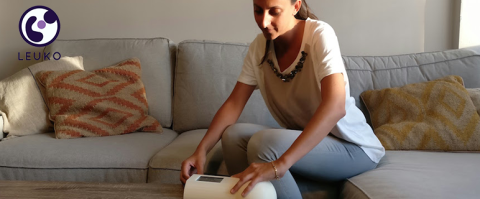
Leuko Labs received major recognition this summer when their non-invasive white blood cell measuring device, PointCheck, won the top prize at the MassChallenge HealthTech (formerly PULSE@ MassChallenge) Finale. Leuko co-founder, Carlos Castro-Gonzalez, was inspired to develop the technology with his partners at MIT after watching a friend go through treatment for non-Hodgkin's lymphoma. A typical chemotherapy cycle usually lasts about three weeks, resulting in a rise and fall of white blood cell levels after each treatment. The problem, as Castro-Gonzalez points out, is that current treatment methods only measure white blood cell counts before a new round of chemotherapy, leaving patients and providers in the dark about white blood cell counts after treatment. PointCheck fills that gap by allowing providers to see if a patient’s white blood cell count is at a healthy threshold at any time and determining how, if at all, they should change their treatment plan.
Why did you decide to locate in Massachusetts?
Our team actually originally met at MIT where we started working on this technology so I guess it was only natural for us to set up shop in Massachusetts. The other reason is the innovation and entrepreneurial ecosystem here is very strong, particularly for the healthcare field. We do a lot of work with hospitals and having access to such world class physicians helped us immensely as we developed our technology and equipment.
How is your product digital health?
PointCheck uses data analytics, artificial intelligence, and machine learning. It’s also a digital product. The at home and monitoring side of it requires a digital platform to send the data collected from the device to providers.
What challenges did you face from stakeholders?
One particular challenge in the digital space is that the value proposition has to appeal to many stakeholders: physicians, regulators, payors, patients. You have to appeal to all of them and that is not always easy. Our value proposition to physicians and patients is to increase clinical outcomes. The value proposition to payors is the reduction in the number of admissions.
Who was the most challenging group to appeal to?
The payors, easily. I think physicians and patients see the value proposition immediately with better care or outcomes. Payors require a higher level of evidence. You don’t have to show increased clinical outcomes or that the tech works, you have to show a return on investment and that’s a challenge in many cases.
What were some of the challenges you and your company faced as you got off the ground?
We have three areas of challenges: technical, business, and regulatory. We had technical challenges in developing the device. We were doing a blood test that doesn’t require a blood sample, this has never been done before and was very risky. The business model with payors is based on savings that we are producing for them. Finally, it has been very challenging to navigate the regulatory environment.
What has your experience been like with PULSE?
It allowed us to be connected with three champions: Philips, Servier, and Sunovion. It was very important for an early stage company like us to connect with them and interact with them and their customers. It helped immensely. I think for many other startups there were hospitals and payors involved, too. We already had a relationship with MGH but I think for others that was a big piece of value because it allowed them to connect with clinicians to do pilots with their technology. These relationships led to really great outcomes from PULSE. I think in our case, too, we got the first prize award, and that recognition from the community has helped us a lot with fundraising and more. I would strongly recommend that anyone considering an accelerator program apply to PULSE.
Who are some of the leaders in this space? What have they done to help grow digital health in the Commonwealth?
We are really biased towards MIT because we had immense help from MIT Sandbox and MIT Entrepreneurship. You can get a lot of connections with funding and more there. Another great resource has been MassBIO, they had a program geared towards entrepreneurs that matched them with industry professionals in the space.
You have six employees. What are some of the workforce needs of the Digital Health industry here in Massachusetts?
We are looking for engineers with hardware and software backgrounds. Business developers with expertise in the healthcare space. Regulatory affairs experts are always in high demand in this space, too.
What’s next for Leuko?
We are leaving MIT and spinning out this fall. The first prize cash from PULSE will help us make that next step. We are piloting with Mass General Hospital and need to develop another proof of concept as we move toward FDA regulatory trials in 2020. We are closing a seed round by the end of the year, as well.
